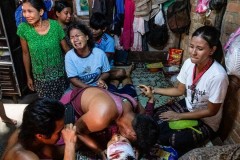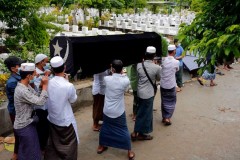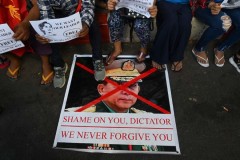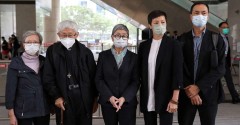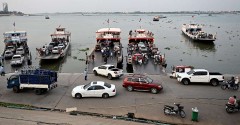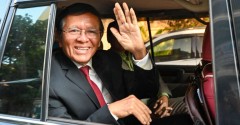
NEWSLETTERS
What’s happening in Asian Church
and what does it mean for the
rest of the world?
Updated: December 03, 2021 04:10 AM GMT
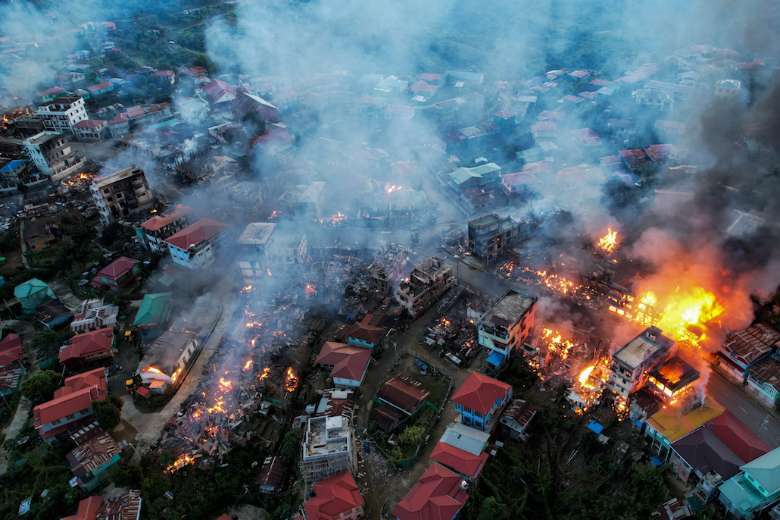
An aerial photo taken on Oct. 29 shows smoke and fires in Thantlang in Chin state, where more than 160 buildings have been destroyed by shelling from Myanmar troops, according to local media. (Photo: AFP)
Thantlang in Myanmar’s Chin state is on fire — literally — with many echoes of the assault on the Rohingya in 2016 and 2017, and yet the world is looking the other way.
In recent days at least 160 buildings, including several churches, have been destroyed by Myanmar army shelling of the town, and there are reports that soldiers are on the streets torching houses.
Although most of the population had already evacuated, some remain, trapped and in grave danger. Among them, according to the Chin Human Rights Organization (CHRO), is an orphanage with more than 20 children and teachers, unable to flee.
CHRO’s offices in the town, along with those of Save the Children and the French development agency GRET, are ablaze, as are the Presbyterian Church, Church on the Rock and a building attached to the Thantlang Baptist Church, the largest congregation in the town. The first rockets reportedly landed at the entrance to the Baptist church.
The burning of Thantlang town follows the destruction of four villages in Falam township including Thlanrawn, Taal and Rialte last week.
The threat made in September by a Myanmar military spokesman, Brigadier General Zo Myint Tun, that the junta had the capability to “obliterate Chin” is in danger of being fulfilled.
The only thing the junta understands is action — and immediate, impactful action is what we need from the international community to put an end to this horrible genocide
Dr. Sasa, the exiled National Unity Government's minister for international cooperation and an ethnic Chin, issued a statement saying that “Thantlang, and indeed all of Chin state, is under massive attack by the forces of the terrorist military junta calling itself the ‘SAC’ and is greatly in need of your prayers and urgent material support.”
He said he was “shocked by the sheer level of brutality and cruel disregard for humanity on display by the junta forces who as we speak are slaughtering innocent, peace-loving civilians; damaging, burning, and looting their homes; and cutting off their access to food, medicine and other basic necessities.”
This extreme violence by the junta is, Dr. Sasa says, an “all-out assault on innocent civilians with heavy battlefield weapons” in response to the fact that people oppose the coup and continue to struggle for democracy and freedom. But he warns that without international action more lives will be lost and “the fires lit in Chin state by the murderous military regime will engulf the entire nation.” The regime “seeks to reduce our brave people and beautiful country to ashes — but we must not allow this to happen. The international community must not let this happen.”
Dr. Sasa calls on the international community to take immediate action to cut off the junta’s access to funds, fuel, weapons, ammunition and, most of all, international legitimacy.
“It is these which enable the junta to continue slaughtering innocent civilians and razing the nation,” he says. “Words will have zero effect, as has been proven time and time again. The only thing the junta understands is action — and immediate, impactful action is what we need from the international community to put an end to this horrible genocide.”
He is absolutely right. Time after time over past decades, history has shown that condemnatory statements, or attempts at dialogue, by themselves have no effect on Myanmar’s military. Only when they are accompanied by robust, decisive, punitive action does the military pause. Only when the military’s own interests are impeded is there any chance of the military ceasing its bloody rampage.
For too long, since the coup on Feb. 1, the world has reacted with words and little action. There have been some targeted sanctions, which are welcome, but more is needed. Every effort must be made to cut the lifeline to the military — and provide a lifeline to the people. That means enforcing a global arms embargo, exposing, embarrassing and holding to account those who continue to provide the regime with arms, freezing the military’s bank accounts and sanctioning its enterprises. It also means providing urgently needed humanitarian aid through cross-border mechanisms, ensuring that such assistance reaches the most vulnerable without being blocked or stolen by the military.
Unrestrained, Myanmar’s military has no compunction about slaughtering its citizens and committing appallingly brutal atrocities with impunity
And such action must be coordinated. That’s why there’s an urgent need for the UN Security Council to hold an emergency meeting on the crisis, as the UN special rapporteur on human rights in Myanmar, Chin civil society groups, Burma Campaign UK and others have called for. Britain has confirmed it is in discussions with the Security Council, and its leadership is welcome.
There’s also a need for high-level diplomatic action. UN secretary-general Antonio Guterres has been alarmingly low-key and lackluster in response to the Myanmar crisis. Perhaps there are initiatives he is taking behind the scenes, but the moral authority of his office needs to be made visible and deployed to mobilize member states into action. He should lead a high-level delegation to the region urgently, to bang heads together and galvanize an action plan.
The crisis in Thantlang, while shocking, is not surprising. We have been here before — most recently with the genocide of the Rohingya but also with escalating assaults on Kachin, Karen, Karenni, Shan, Rakhine and other ethnic groups, and the massacres of pro-democracy protesters in 1988, 1996, 2007 and in the immediate weeks following this year’s coup.
Unrestrained, Myanmar’s military has no compunction about slaughtering its citizens and committing appallingly brutal atrocities with impunity. The lesson that should be learned from past examples is that if the world does not ensure that there are tough consequences for such crimes against humanity, the perpetrators will go on committing them — with increasingly devastating results.
It is already too late for Thantlang. The destruction and displacement have happened. But let Thantlang be a wake-up call to the world, especially the UN Security Council, to act before it is too late for the rest of Myanmar.
* Benedict Rogers is a writer, human rights activist and senior analyst for East Asia at the international human rights organization CSW. He is the author of three books on Myanmar, including “Burma: A Nation at the Crossroads”. His story of becoming a Catholic in Myanmar is told in his book “From Burma to Rome: A Journey into the Catholic Church”. The views expressed in this article are those of the author and do not necessarily reflect the official editorial position of UCA News.









